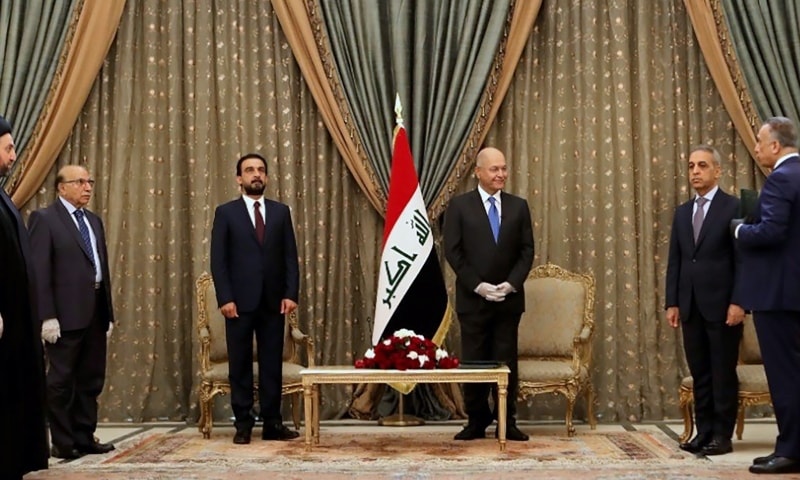BAGHDAD: Iraqi President Barham Saleh nominated spy chief Mustafa Kadhemi on Thursday as the country’s third prime minister-designate this year, moments after his predecessor ended his bid to form a government.
Kadhemi, the 53-year-old head of the National Intelligence Service, has ascended to the role as Iraq faces a budget crisis brought on by the collapse in world oil prices and the spread of the novel coronavirus.
His nomination was attended by ministers, political rivals and even the United Nations’ representative in Iraq, indicating widespread support for Kadhemi that neither of the previous PM-designates had enjoyed.
Moments before the ceremony, his predecessor Adnan Zurfi announced he was withdrawing his candidacy due to “internal and external reasons”, without elaborating.
Zurfi had been staunchly opposed by hardline Shia factions with close ties to Iran, which enjoys vast political and military influence in Baghdad.
Any candidate for the premiership, observers say, must have a green light from Iraq’s Shia, Kurdish and Sunni communities, as well as Iran and its rival, the US.
Kadhemi was able to secure that support after weeks of lobbying that peaked in a flurry of meetings in Baghdad over the last week, sources close to him said.
Among them were gatherings attended by Iranian General Ismail Qaani, who has headed Iran’s powerful Quds Force foreign operations unit since a US drone strike in Baghdad killed his predecessor Qasem Soleimani in January.
With ties to both Washington and Tehran, and particularly close links to Saudi Crown Prince Mohammed bin Salman, Kadhemi may be best equipped to steer Iraq through the brewing political storm, observers say.
“It’s a win for Iraq, especially in this difficult economic phase, as he could ensure the renewal of Baghdad’s waiver to the US sanctions imposed on Iran,” said a senior political figure in the Iraqi capital.
But first, he must submit a cabinet lineup to Iraq’s 329-member parliament for a vote of confidence by May 9.
That will require a long process of consultations with various political parties, as top positions in Iraq’s sectarian power-sharing system are typically doled out through horsetrading and consensus.
Neither of the previous candidates for prime minister had been able to reach that step.
If he succeeds, Kadhemi would replace Iraq’s caretaker premier Adel Abdel Mahdi, who came into power in 2018 when political blocs opted for him over Kadhemi.
But if the intel leader fails, political sources close to the talks said, Shia blocs would struggle to find another consensus candidate, leaving Abdel Mahdi in place for the foreseeable future.
Published in Dawn, April 10th, 2020














































Dear visitor, the comments section is undergoing an overhaul and will return soon.